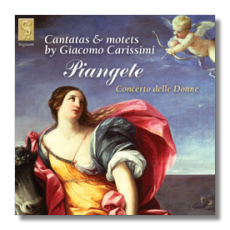
The Internet's Premier Classical Music Source
Related Links
- Latest Reviews
- More Reviews
-
By Composer
-
Collections
DVD & Blu-ray
Books
Concert Reviews
Articles/Interviews
Software
Audio
Search Amazon
Recommended Links
Site News
 CD Review
CD Review
Piangete

Cantatas and Motets
- Giacomo Carissimi:
- Motets:
- Surrexit pastor bonus
- Cum reverteretur David
- Benedictus Deus et Pater
- ExuIta, gaude, ilia Sion
- O dulcissimum Mariae nomen
- Omnes gentes gaudete cum victore
- Cantatas:
- Va dimanda al mio pensiero
- Siam tre miseri piangenti
- Ahi, non toma
- Piangete, ohime piangete
- Si dia banda, aIIa speranza
- Girolamo Frescobaldi: Parte sopra lamonicha
- Giovanni Kapsberger:
- Prélude X & XI
- Toccata XI
- Michelangelo Rossi: Toccata Settima
Gill Ross
Donna Deam
Elin Manahan Thomas
Alastair Ross, keyboards
David Miller, chitarrone
Concerto delle Donne
Signum SIGCD040 66:24
Three sopranos, whose voices blend delightfully together, make up the latter day Concerto delle Donne to specialise in the late 16th & early 17th Century repertoire of court ladies in Ferrara. They concentrate on cantatas and motets by Giacomo Carissimi (1605-74), the secular items intense settings of texts about the torments and joys of love. Several by Carissimi are in the library of Christ Church Oxford; the cantata Siam tre miseri piangenti is full of pain, suffering and anger, with three equal voices intertwining and reacting to one another. Donna Deam's solo Piangete and Gill Ross' and Elin Thomas's duet Ahi, non torna are in like mood, with 'highly emotional, self-obsessed texts', but Va dimanda al mio pensiero and Si dia bando, alla speranza are lighter – attractive, tuneful pieces.
The church music includes Cum reverteretur David, a virtuosic account of the rivalry between David and Saul. Exulta, gaude, filia Sion celebrates Christmas and may be the only item recorded previously, and Benedictus Deus et Pater weaves rich dissonances, as does Michelangelo Rossi in the most extraordinary of the instrumental items, his dissonant chromatic Toccata Settima for harpsichord. The accompaniments are varied with harpsichord and organ (their coding on p. 26 of the otherwise excellent booklet reversed with respect to the identification of performers on p. 2) and citarrone; there are also a few short solo pieces by Kapsberger for that eye-catching bass lute, usually seen but little heard in period orchestras.
In one of the solos there are signs of a little stress in highest tessitura, but nothing to put you off. Recommended for all collectors of the exuberant Italian vocal music of this period.
Copyright © 2003, Peter Grahame Woolf




















